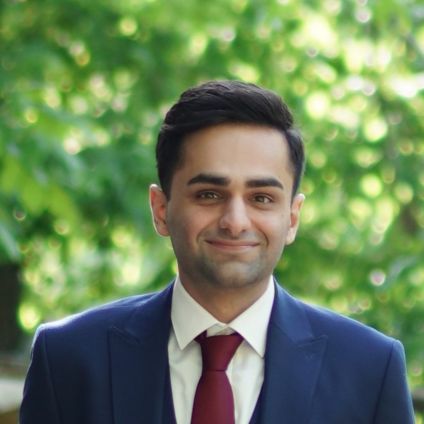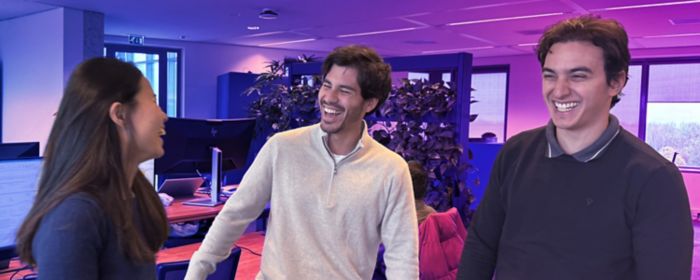New technologies, such as Artificial Intelligence, are changing the way we audit financial statements and providing opportunities for auditors to evolve and make an impact. But what exactly does that look like in practice? Miray Ayyildiz and Ahmad Bijani, digital auditors at KPMG, talk about their experiences and share their vision for the future of their profession.
Miray's first year at KPMG: from manual data processing to automated auditing
Miray began her career at KPMG only a year ago, as a trainee. “In my first year, it was important to master the basics of auditing. That mainly meant a lot of repetitive tasks: checking data, selecting and entering data manually. But even in that year I noticed changes. Whereas I previously had to check everything myself, now a tool does it automatically. Instead of checking the data myself, I now assess the results. That makes the work not only more efficient, but also more challenging.”
Ahmad's transformation at KPMG: from regular to digital auditor
Ahmad has had an impressive career development at KPMG. “In my early years, I was a regular auditor, but my passion for IT started in high school. After a hackathon at KPMG, in which we had to develop an innovative solution within a week, I knew that digital auditing was my calling. This was the starting point of my transition to a new role. Now I focus entirely on digital auditing, supporting teams in developing and implementing advanced tools that make audits more efficient and reliable. In this role, I can really make an impact, both for our teams and for our clients.”
New skills for the auditor of the future
With the rise of AI, the work of auditors is changing. “You have to master not only the basics of auditing these days, but also develop new technical skills,” Ahmad explains. “Dealing with large data sets is one of the main challenges. Excel is often no longer adequate, so you have to learn to work with tools that can process and analyse large amounts of data.” In addition, communication and collaboration becomes even more important, according to Ahmad: “You have to talk to different departments within companies to better understand how their systems communicate with each other. Only then can you set up an analysis. And of course, you also want to include clients in the process and how you come to a conclusion based on data analysis.”
You really don't have to be a technical specialist, but it is important that as an auditor you have a global understanding of how machine learning works. Fortunately, KPMG offers many training courses to learn new skills!

Auditors who understand machine learning: critical to the future of auditing
Miray emphasises the importance of machine learning in the modern audit world: “It is essential that auditors understand how machine learning works. While you don't have to be a specialist, it's important to know what AI can do and where its limitations lie. This also means recognising when AI is not the right solution. AI is a powerful tool, but ultimately, it's all about human interpretation and making the right decisions. Fortunately, KPMG offers extensive training to develop these new skills – I attended several sessions last summer.”
More room for creativity and client insight
Above all, what does AI enable? “That we as auditors can focus on the more interesting aspects of our work,” Miray believes. “It is much more motivating to collaborate on innovative solutions than to spend whole days typing numbers.” “True, it gives us more room for problem-solving thinking,” Ahmad enthuses. “It sometimes feels like making a sudoku every day: there is no standard solution, so you have to be creative and explore all the possibilities. That makes the work challenging and very rewarding, especially when you see that teams and clients are impressed by what we have achieved.”
A look at the future of audit: challenges and opportunities
When it comes to the future of auditing, both Miray and Ahmad see great opportunities. But there are also challenges. “I sometimes worry that we rely too much on AI and forget certain basic skills,” Miray admits. “Still, I see opportunities above all: AI gives us the ability to make auditing more reliable and efficient. The possibilities are endless, and I am curious to see all the new developments. Now, we always issue ‘reasonable assurance’. Thanks to AI, in the future that could just be ‘absolute certainty’!”
It sometimes feels like making a sudoku every day: there is no standard solution, so you have to be creative and explore all the possibilities.

Ahmad sees a future in automation: improving focus on risk management and process improvement
Ahmad particularly sees a lot of potential in further automation: “Documentation and administration are time-consuming and less enjoyable processes in our profession. I look forward to us being able to automate almost everything in the future so that we can focus on the real risks. The further we go in this, the more we can help our clients improve their processes and better manage their risks.”
Discover your future at KPMG and join our innovative audit team
Do you also want to be part of a team at the forefront of digital innovation within the audit world? Check out our vacancies and find out which role suits you!






